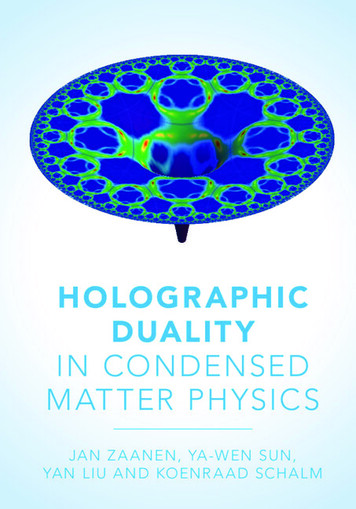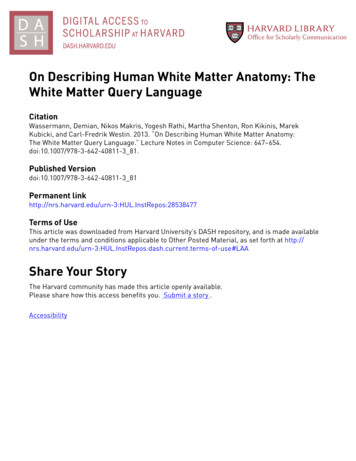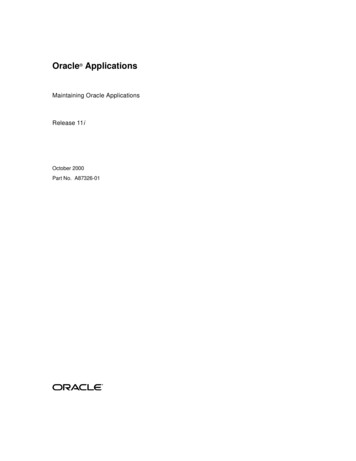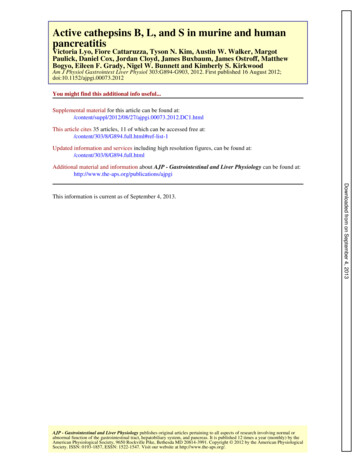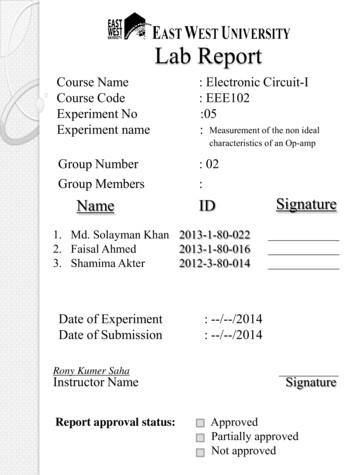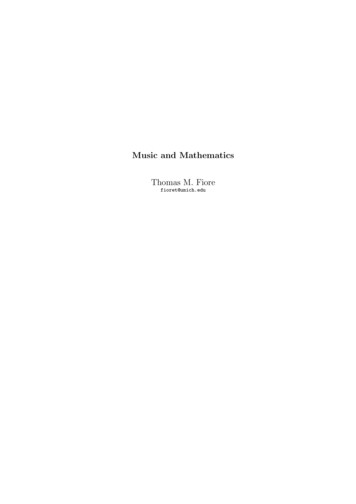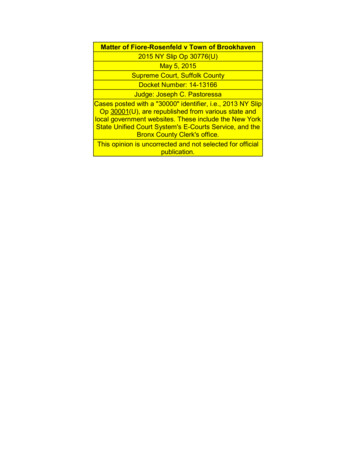
Transcription
Matter of Fiore-Rosenfeld v Town of Brookhaven2015 NY Slip Op 30776(U)May 5, 2015Supreme Court, Suffolk CountyDocket Number: 14-13166Judge: Joseph C. PastoressaCases posted with a "30000" identifier, i.e., 2013 NY SlipOp 30001(U), are republished from various state andlocal government websites. These include the New YorkState Unified Court System's E-Courts Service, and theBronx County Clerk's office.This opinion is uncorrected and not selected for officialpublication.
[* 1]MEMORANDUMSUPREME COURT, SUFFOLK COUNTYI.A.S. PART 34By: Pastoressa, J.S.C.Dated: May 5 , 20 15STEVE FIORE-ROSENFELD,Petitioner,Index No. 14-13166Mot. Seq. # 001 MD; CDISPSJ- against -TOWN OF BROOKHAVEN,EDWARD J. YULE, LLCAttorney for Petitioner46 Woodbine AvenueNorthport, New York 1 1768BOND, SCHOENECK & KING, PLLCAttorney for Respondent1010 Franklin Avenue, Suite 200Garden City, New York 11530This Article 78 proceeding seeks a judgment (1) annulling the determination ofrespondent Town of Brookhaven denying the request of petitioner Steve Fiore-Rosenfeld that theTown defend him in the action entitled Rush v Town of Brookhaven and Steve Fiore-Rosenfeld,assigned index number 64291/13, (2) directing the Town to provide him with a defense andindemnification in the Rush action, (3) directing the Town to pay all reasonable attorney’s feesincurred in the Rush action to an attorney of his choice, and (4) awarding attorneys fees. For thereasons stated herein, the petition is denied and the proceeding is dismissed.Petitioner Steve Fiore-Rosenfeld formerly was a member of the Town Council ofrespondent Town of Brookhaven. Initially elected in 2003 to represent the First Council Districtof the Town of Brookhaven, Fiore-Rosenfeld served as a Town Councilman from 2004 through2013. In 2008, Jocelyn Rush was hired by the Town to work as a legislative secretary, and wasassigned to work for Fiore-Rosenfeld. Suffering from relapsing-remitting multiple sclerosis,Rush allegedly advised Fiore-Rosenfeld sometime in 20 10 that, due to symptoms related to herautoimmune disease, she was unable to perform certain activities allegedly expected as part ofher job, including walking and standing for long periods of time and door-to-door campaigning.According to Rush, Fiore-Rosenfeld became abusive and started discriminating against her atwork after learning of her disease. She alleges he screamed profanities and berated her at work,
[* 2]Fiore-Rosenfeld v Town of BrookhavenIndex No. 14-13166Page No. 2and prohibited her from taking lunch breaks on days when he was working in his office. Rushallegedly complained to various Town officials about Fiore-Rosenfeld’s treatment of her, but noactions were taken. In December 2012, Rush applied for and was granted a leave of absencefrom her position based on her medical condition.Subsequently, at the end of 2013, Rush commenced an action in this Court against theTown and Fiore-Rosenfeld seeking compensatory and punitive damages. The action, assignedindex number 6429 1/13, alleges, in relevant part, that Fiore-Rosenfeld harassed anddiscriminated against her because of her medical condition, that Fiore-Rosenfeld was abusive andcreated a hostile work environment, and that the Town failed to act on her complaints about suchbehavior. The first cause of action in the complaint alleges that, in violation of the New YorkState Human Rights Law, plaintiff was unlawfully discriminated against and constructivelyterminated from her position with the Town because of her actual or perceived disability. Thesecond cause of action asserts defendants aided and abetted in such disability discrimination, andthe third cause of action, for intentional infliction of emotional distress, asserts defendantsengaged in extreme and outrageous conduct knowing that stress exacerbated plaintiffs disease.In January 20 14, counsel for Fiore-Rosenfeld sent letters to Brookhaven Town Attorney,Annette Eaderesto, requesting a defense and indemnification of Fiore-Rosenfeld in the Rushaction. After allegedly conducting an investigation into Rush’s allegations, the Town Attorney,by letter dated March 10,2014, advised Fiore-Rosenfeld that the Town would not provide adefense or indemnify him for any judgment or costs resulting from the Rush lawsuit, as she haddetermined the allegations against him were outside the scope of his employment as a TownCouncilman, and were “taken for personal and political motives unrelated to the furtherance ofTown interests.”Subsequently, Fiore-Rosenfeld commenced this proceeding for a judgment annulling theTown’s determination that he was not acting within the scope of his employment at the time ofthe conduct that is the subject of the Rush action and, therefore, was not entitled to a defense andindemnification. In addition, Fiore-Rosenfeld seeks a judgment directing the Town to defendand indemnify him in the Rush action, as well as an award for the attorney’s fees incurred inbringing the instant proceeding. The petition alleges, among other things, that the Town isobligated under Public Officers Law 0 18 and the Brookhaven Town Code to provide him with adefense to the underlying action, and that the Town Attorney’s determination refusing to providea defense and indemnification was arbitrary and capricious. It alleges that Fiore-Rosenfeld wasnever personally served with the complaint and received only a photocopy of it from the Townon the last day of his term as Councilman, and that the Town Attorney unduly delayed in makinga determination on his request for a defense and indemnification. Further, the petition allegesthat the Town Attorney falsely created the impression that the Town would defend FioreRosenfeld by engaging in settlement talks with Rush’s attorney, that the Town has denied FioreRosenfeld “access to any of the transcripts, records, complaint letter, determinations or findings”
[* 3]Fiore-Rosenfeld v Town of BrookhavenIndex No. 14-13166Page No. 3related to the Rush action, including a 50-H transcript and certain motion papers, and that thewithholding of evidence prejudices his defense in the underlying action.The Town opposes the petition, arguing the duty to defend and indemnify publicemployees in a civil matter established by Public Officers Law 5 18, adopted by the Town underBrookhaven Town Code 9 20-101, does not apply, because the allegations made against FioreRosenfeld in the Rush action involve intentional wrongdoing outside the scope of hisemployment with the Town. It also asserts it is against public policy for a municipality to usepublic funds to defend against or indemnify for damages caused by intentional misconduct.Moreover, the Town contends the determination by the Town Attorney that the complained-ofconduct by Fiore-Rosenfeld occurred outside his job as Councilman was reasonable and had asound factual basis.The remedy of mandamus to review calls upon the court to examine administrativeactions involving the exercise of judgment or discretion (see Matter of Scherbyn v Wavne-FingerLakes Bd. of Coop. Educ. Servs., 77 NY2d 753). A determination by an agency or official isconsidered administrative and within the scope of mandamus to review if it involved the exerciseof discretion and no quasi-judicial hearing was required to make such a determination; rather, thepetitioner “need only to be given an opportunity ‘to be heard’ and to submit whatever evidencehe or she chooses and the agency may consider whatever evidence is at hand, whether obtainedthrough a hearing or otherwise” (Matter of Scherbvn v Wayne-Finger Lakes Bd. of Coop. Educ.Servs., 77 NY2d 753, 757-758; see Matter of Niagra Frontier Transp. Auth. v DiNapoli, 69AD3d 1209). The standard applied by a court in a mandamus to review proceeding is whetherthe determination of the agency or official was arbitrary and capricious, affected by an error oflaw, or irrational (see Matter of Scherbyn v Wayne-Finger Lakes Bd. of Coop. Educ. Servs., 77NY2d 753; Matter of Pile Found. Constr. Co. Inc. v New York City Dept. of Envtl. Protection,84 AD3d 963; Matter of Ignaczak v Ryan, 79 AD3d 881). Furthermore, it is fundamental thatwhen reviewing a determination that an agency or official alone is authorized to make, the courtmust judge the propriety of such determination on the grounds invoked by the agency or officialin making the decision (Matter of Scherbvn v Wayne-Finger Lakes Bd. of COOP.Educ. Servs., 77NY2d 753, 758; see Matter of National Fuel Gas Distrib. Corn. v Public Serv. Commn. of theState of N.Y., 16 NY3d 360; Matter of Filiposwki v Zoning Bd. of Appeals of Vil. of Greenwood&, 77 AD3d 831).Brookhaven Town Code 5 20-101 adopts Public Officers Law 5 18, which provides, inpart, that a public entity “shall provide for the defense of the employee in any civil action orproceeding, state or federal, arising out of any alleged act or omission which occurred orallegedly occurred while the employee was acting within the scope of his public employment orduties,” and “shall indemnify and save harmless its employees in the amount of any judgmentobtained against such employees . . . provided that the act or omission from which such judgmentor claim arose occurred while the employee was acting within the scope of his public
[* 4]Fiore-Rosenfeld v Town of BrookhavenIndex No. 14-13166Page No. 4employment or duties” (Public Officers Law 3 18 [3][a], [4][a]). The statute, however, alsoprovides that the duty to indemnify and hold harmless shall not apply where the injury or damagewas caused by “intentional wrongdoing or recklessness on the part of the public employee”(Public Officers Law Q 18 [4][b]). Further, pursuant to Public Officers Law Q 18 (3)(b), a publicemployee is “entitled to be represented by a private counsel of his choice in any civil action orproceeding whenever the chief legal officer of the public entity . . . determines that a conflict ofinterest exists, or whenever a court, upon an appropriate motion or otherwise by specialproceeding, determines that a conflict of interest exists and that the employee is entitled to berepresented by counsel of his choice.”The March 10,2014 letter from Town Attorney Eaderesto to Fiore-Rosenfeld advisesthat, based on the allegations in the complaint and an independent investigation, she determinedthe actions at issue in the Rush lawsuit were not within the scope of his job as a TownCouncilman. As support for the Town’s refusal to defend and indemnify Fiore-Rosenfeld, theletter refers to certain allegations of wrongdoing set forth in the underlying complaint, includingthat Fiore-Rosenfeld required Rush, in addition to her performing her duties as a legislativesecretary, to help his re-election campaign; that he asked Rush, or her children, to perform doorto-door campaigning on his behalf; and that he gave Rush a 1,000 bonus, but gave a coemployee on his staff a 10,000 bonus, because he believed her efforts in support of his reelection were insufficient. It also states the conclusion of the Town Attorney that thecomplained-of conduct was related to Fiore-Rosenfeld’s political goals and was intended to“advance [his] own personal agenda.”Whether a public employee’s acts were committed within the scope of his or heremployment is a factual question (Matter of Williams v City of New York, 64 NY2d 800, 802;see generally Riviello v Walden, 47 NY2d 297). As indicated above, the question of whether apublic employee named in a civil action is entitled to a defense and indemnification for an act oromission that allegedly occurred when he or she was acting within the scope of his or her publicemployment duties is to be determined in the first instance-by the public officer designated by thepublic entity employing such person (Public Officers Law Q 18 [3][b]), and such determinationmay only be set aside if it as arbitrary and capricious, Le., lacks a factual basis (Matter ofWilliams v City of New York, 64 NY2d 800, 802; Matter of Polak v Citv of Schenectadv, 181AD2d 233; see Matter of Grecco v Cimino, 100 AD3d 892; Matter of Vitucci v Citv of NewYork, 272 AD2d 620).The Town Attorney’s decision that Fiore-Rosenfeld was not acting within the scope of hisemployment as a Town Councilman as to the incidents that are at issue in the Rush action wasnot arbitrary and capricious. An employee’s actions will be found to fall within the scope ofemployment if “the purpose in performing such actions is ‘to further the employer’s interest, orto carry out duties incumbent upon the employee in furthering the employer’s business”’(Beauchamp v City of New York, 3 AD3d 465,466, quoting Stavitz v Citv of New York, 98
[* 5]Fiore-Rosenfeld v Town of BrookhavenIndex No. 14-13 I66Page No. 5AD2d 529,53 1; see Selmani v City of New York, 1 16 AD3d 943; Pinto v Tenenbaum, 105AD3d 930; Danner-Cantalino v City of New York, 85 AD3d 709). Conversely, actions taken byan employee for wholly personal reasons, which are not job related, are outside the scope ofemployment (Beauchamp v City of New York, 3 AD3d 465,466). Here, the Town Attorneyreasonably determined that the tortious actions of Fiore-Rosenfeld alleged by Rush were takenfor personal reasons, not to further the Town’s interest, and were outside the scope of his dutiesas a Town Councilman (see Matter of Polak v City of Schenectady, 181 AD2d 233; see alsoGrasso v Schenectady County Public Library, 30 AD3d 814; Evans v City of Mount Vernon, 92AD3d 829). Thus, the Town Attorney reasonably concluded petitioner is not entitled underaction or to indemnification in the eventPublic Officers Law 5 18 to a defense in thejudgment is granted against him.Accordingly, the petition is denied and the proceeding is dismissed.,/FINAL DISP. (, NON-FINAL DISP.
Town defend him in the action entitled Rush v Town of Brookhaven and Steve Fiore-Rosenfeld, assigned index number 64291/13, (2) directing the Town to provide him with a defense and indemnification in the Rush action, (3) directing the Town to pay all reasonable attorney's fees

